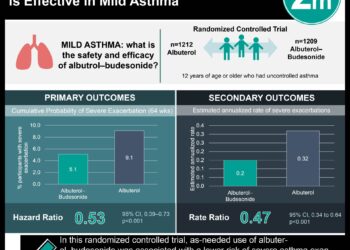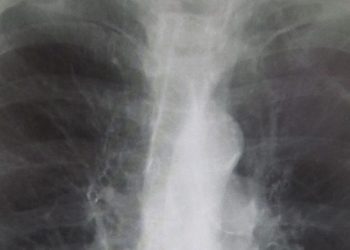Itepekimab provides beneficial effects for patients with moderate-to-severe asthma.
1. Treatment of moderate-to-severe asthma with itepekimab was shown to demonstrate greater asthma control than treatment with placebo.
2. Treatment with itepekimab was shown to improve lung function in patients with moderate-to-severe asthma than treatment with placebo.
Evidence Rating Level: 1 (Excellent)
Study Rundown: Current biologic therapies for moderate-to-severe asthma include targeting IgE, interleukin-4, interleukin-13, and interleukin-5. However, many patients with asthma continue to have symptoms, exacerbations, and reduced lung function even after taking these biologic therapies. Itepekimab is a new human IgG4P monoclonal antibody against interleukin-33 that has been proposed to modify inflammation that contributes to asthma. However, there is a gap in knowledge as to understanding the safety and efficacy of itepekimab treatment for patients with moderate-to-severe asthma. This study found that itepekimab treatment demonstrated greater asthma control and improved lung function when compared to placebo treatment in patients with moderate-to-severe asthma. This study was limited by a lack of total understanding with regards to finding the predictive biomarkers for response to the anti-interleukin-33 blockade. Nevertheless, these study’s findings are significant, as they demonstrate that itepekimab monotherapy is more effective than a placebo for the treatment of moderate-to-severe asthma.
Click to read the study in NEJM
Relevant Reading: Tezepelumab in Adults and Adolescents with Severe, Uncontrolled Asthma
In-Depth [randomized control trial]: This randomized controlled trial enrolled 296 patients at 70 sites. Patients who were between 18 to 70 years of age, had physician-diagnosed asthma for at least 12 months, and had been receiving inhaled glucocorticoids in combination with long-acting beta-agonists were included in the study. Patients who were positive for tuberculosis on screening, had forced expiratory volume in 1 second (FEV1) that was out of range were excluded from the study. The patients were randomized in a 1:1:1:1 ratio to receive either subcutaneous itepekimab, itepekimab plus dupilumab, dupilumab, or placebo, every 2 weeks for 12 weeks, respectively. The primary outcome measured an event indicating loss of asthma control defined as a reduction of at least 30% from baseline in morning peak expiratory flow on 2 consecutive days, change in FEV1 from baseline at 12 weeks, and chance in asthma control as assessed by the five-item Asthma Control Questionnaire. Outcomes in the primary analysis were assessed via a logistic regression model. Among the groups, loss of asthma control was lower in all three active treatment groups than the placebo group: 22% in the itepekimab group (odds ratio [OR], 0.42; 95% confidence interval [CI], 0.2 to 0.88; p = 0.02); 27% in the combination group (OR, 0.52; 95% CI, 0.26 to 1.06; p = 0.07); and 19% in the dupilumab group (OR, 0.33; 95% CI, 0.15 to 0.70), as compared with 41% in the placebo group. FEV1 was also higher at week 12 among the three active treatment groups as compared to placebo, with the least-square mean differences in FEV1 as compared to placebo displayed here: with itepekimab, 0.22 liters (95% CI, 0.02 to 0.41); with combination therapy, 0.19 liters (95% CI, -0.01 to 0.40); and with dupilumab, 0.34 liters (95% CI, 0.14 to 0.54). Overall, this study determined that the effectiveness of itepekimab as monotherapy for moderate to severe asthma is more effective than placebo treatment.
Image: PD
©2021 2 Minute Medicine, Inc. All rights reserved. No works may be reproduced without expressed written consent from 2 Minute Medicine, Inc. Inquire about licensing here. No article should be construed as medical advice and is not intended as such by the authors or by 2 Minute Medicine, Inc.







